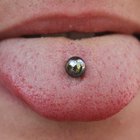Piercing the tongue has ancient antecedents, but it wasn't until the 1990s and the rise of body-modification culture that tongue piercing became widespread. Piercer Elayne Angel is often credited with popularizing this particular piercing among both men and women. Why a person gets a particular body part pierced is often a personal, idiosyncratic decision, but there are some common reasons and misconceptions that can be addressed.
Enhanced Sexual Pleasure
There's a widespread misconception that the only reason to get a tongue piercing is to improve your ability to give blow jobs, and that therefore any man who gets a tongue piercing must be gay. What's true is that men both gay and straight sometimes get a tongue piercing with enhanced oral stimulation in mind—and many women report that they enjoy the feeling of a man's tongue piercing during cunnilingus very much indeed.
Aesthetics
Some men simply enjoy the way a tongue piercing looks and feels in their mouth. Or they may enjoy having a semi-private, semi-public piercing—one that can only be glimpsed in everyday conversation but is easy to show off to the right audience.
Spiritual and Ritual Significance
Certain ancient and tribal cultures pierced their tongue for ritual purposes. Aztec and Mayan art depicts this practice, and a central Australian tribe called the Aranda still perform these piercings to mark the initiation of a shaman. Piercing the tongue or any other part of the body may be done as a way to face fear of pain, to mark a transition in life or to claim and customize your body as your own.
Permanence
Body piercings should never be considered temporary—they are permanent body modifications that often leave scars, marks or other alterations to the body. That said, tongue piercings are among the easiest piercings to "retire." Once the jewelry is removed, the hole will close up quickly. A mark may or may not be left behind.
Risks
As popular as tongue piercings are, they do carry some risk. Aside from the risk of infection that comes with all piercings (particularly oral piercings), tongue piercings are known to cause significant wear on tooth enamel, especially if the bearer "plays" with the jewelry by running it against the back of his teeth. Teeth can even crack eventually because of this habit. Tongue piercings may also contribute to receding gums, if the piercing is pushed repeatedly against the front teeth. Many dentists actively discourage tongue piercings for this reason.
Related Articles

Male Nipple Piercing Information

When Did Men First Start Wearing ...

10 Reasons to Get a Nose Ring

Reasons to Get a Nose Ring

Complications of Nipple Piercing

What Is the Meaning of a Ring in the ...

When Did Pierced Ears Originate?

The Significance of Earrings on Men

How Dangerous Is It to Pierce Your ...

Reactions to Nose Piercings

How to Clean a Tongue Ring

About Christian Men Wearing Earrings

Why Does the Wedding Ring Go on the 4th ...

What Do Frog Tattoos Mean?

Relationship Love Vs. Family & ...

Why Do Men Wear Wedding Bands on Their ...

Different Body Piercings for Women

How to Clean Smiley Piercings

Ribbon Meanings for a Handfasting ...

What Size Gauge Is an Ear Piercing Gun?
References
- AskMen.com: Piercings And Sex
- "The Piercing Bible"; Elayne Angel; 2009
Writer Bio
Lori A. Selke has been a professional writer and editor for more than 15 years, touching on topics ranging from LGBT issues to sexuality and sexual health, parenting, alternative health, travel, and food and cooking. Her work has appeared in Curve Magazine, Girlfriends, Libido, The Children's Advocate, Decider.com, The SF Weekly, EthicalFoods.com and GoMag.com.